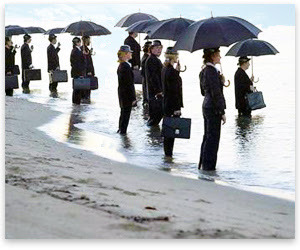The idea that the very same economic forces that are
currently plaguing Greece, et al., are somehow not relevant to the United
States' circumstances does not hold water. As goes the rest of the world,
so goes the US.
When we back up far enough, it is clear that money and
debt are there to reflect and be in service to the production of real things by
real people, not the other way around. With too much debt relative to
production, it is the debt that will suffer. The same is true of money. Neither
are magical substances; they are merely markers for real things. When they get
out of balance with reality, they lose value, and sometimes even their entire
meaning.













